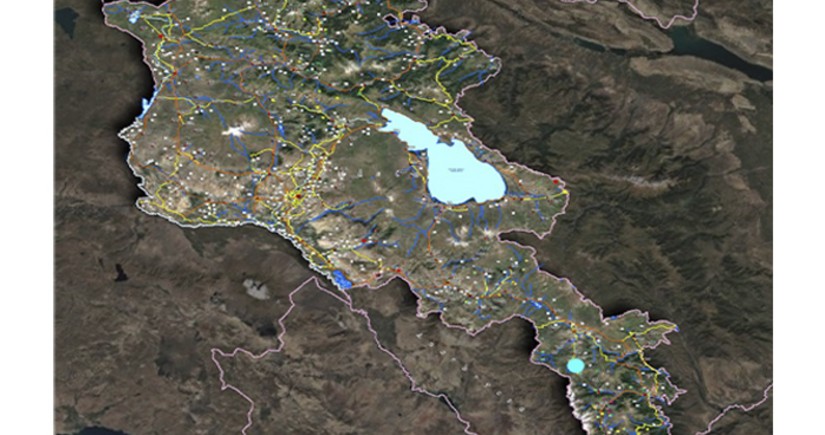NGOs from 13 countries call on Armenia to coordinate mining efforts with Azerbaijan
- 02 April, 2025
- 12:46

Twenty-nine non-governmental organizations (NGOs) from 13 countries have sent an Appeal to the Secretariat of the Espoo Convention and Extractive Industries Transparency Initiative on the Protection of Environment in the South Caucasus Region.
According to Report, the appeal expresses the satisfaction of the Environmental Protection First (EPF) NGO Coalition with the preparation of a map illustrating the ecological damage caused by mining activities to transboundary rivers in the Republic of Armenia.
"The Environmental Protection First (EPF) NGO Coalition created a map highlighting the environmental damage to the transboundary rivers caused by the mining activities in the Republic of Armenia. We, the civil society organizations from different countries express our support for this Coalition and emphasize the importance of cooperation with EPF. The map (attached) illustrates that waste containing high concentration of heavy metals, generated from extractive industry operations in the territory of Armenia, is being discharged into transboundary rivers," the appeal reads.
It notes that the mining activities in the basins of rivers such as Pambak (Debed), Aparanchay, Zangichay, Vedichay, Arpachay, Okchuchay, Bazarchay etc.—positioned in the upper and middle reaches of the Kur and Araz rivers—have a direct adverse impact on Azerbaijan and neighboring countries. The severe chemical pollution of Araz River, the region’s large freshwater source, poses a significant threat to the population, biodiversity, soil, and aquatic life.
"We strongly condemn these actions that blatantly disregard internationally recognized standards and principles, particularly those established under the UN Economic Commission for Europe’s (UNECE) Convention on Environmental Impact Assessment in a Transboundary Context (Espoo Convention), which acknowledges the necessity of international cooperation and dialogue when multiple countries are affected by transboundary activities. Following the guidelines of the Convention, the environmental assessment reports of the industrial facilities should be shared with all affected parties. The ongoing mining activities without getting a consent from neighboring affected parties, including Azerbaijan, constitutes a clear breach of the Convention," the appeal reads.
It further notes that despite repeated calls from civil society, Armenia refuses the cooperation which raises significant doubts on its commitment to transparency and responsible environmental governance. Economic development of Armenia should not be pursued at the cost of environmental harm or the pollution of water bodies.
"We urge EITI to take into account these serious environmental breaches, which are inconsistent with EITI principles, when evaluating the transparency of Armenia’s extractive industry. Furthermore, international experts, along with Azerbaijani and foreign NGOs, must be granted access to the mining facilities for on-site monitoring and verification of environmental and operational practices. We call the Espoo Convention and EITI Secretariats to contribute to this process and are open to discussing the matter further," the appeal says.
The appeal is signed by:
- Laura Kezhaeva, Femina NGO, Finland
- Kungiyar Matasan, Kano advocacy organization, Nigeria
- Joseph SEVERE, UNASCAD, Haiti
- Peter Owiti, Wote Youth Development Projects CBO, Kenya
- Abdoulsamad Said Arreh, Social Development organization – “Paix&Lait”, Djibouti
- Dare Akogun, DA News Media Advocacy for Climate Literacy and Justice, Nigeria
- Mohamed Abderrahmane Cheikh Dah, GreeM Environment, Chad
- Dr. Uzodinma Adirieje, Afrihealth Optonet Association (AHOA) - CSOs Network, Nigeria
- Dr. Mohamed Lamine, Society for Conservation and Sustainability of Energy and Environment in Nigeria (SOCSEEN), Nigeria
- Agbavito Koku Selom, Association des Volontaires pour l'Environnement Sain, Togo
- Joseph Silali, 350 Kenya/ABO'S AFRICA, Kenya
- Mustapha Umar Yushau, Kano advocacy organization, Nigeria
- Nicolai Russu, Youth Vision NGO, Moldova
- Aniedi Inyang, Enemas Resources Foundation, Nigeria
- Aamir Khan, Climate Hub Forum, Pakistan
- Laura Rajala, Green Habito, Finland
- Thulisile Maziya Sinatsisa Lubombo, Women and girls Empowerment organization, Eswatini
- Eliud Emeri, TUBAE- International, Kenya
- Polycena Akadeli, Turkana Gender and Child Protection Network (TGCPN), Kenya
- Ridhiwani Sadiki, Citizen Network For Rural Development, Kenya
- Cornelius Lochuch TODANYATU CBO, Kenya
- George Williams Kafeero, Hope Community Initiative, Uganda
- Mukunde Penninah, Engendering Gender International, Uganda
- Joseph Ngaukon Achuka, Ayok multi-development organization, Kenya
- Dr. Uzodinma Adirieje, Foundation DUZAFOUND, Nigeria
- Emmanuel Esio Global Leadership Initiatives for Education, Health and Social Development (GLIEHSD), Nigeria
- Patrick Sawasawa Odrapna AFRICA, DRC
- Edson Mughongo Ibanda, Girl-child care İnitiative, Uganda
- Asaduzzaman Tohin OAB Youth Foundation, Bangladesh.
